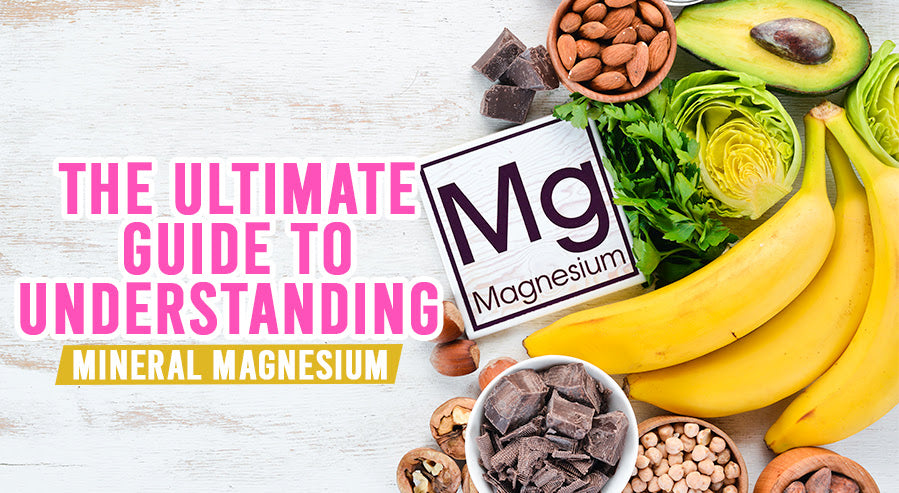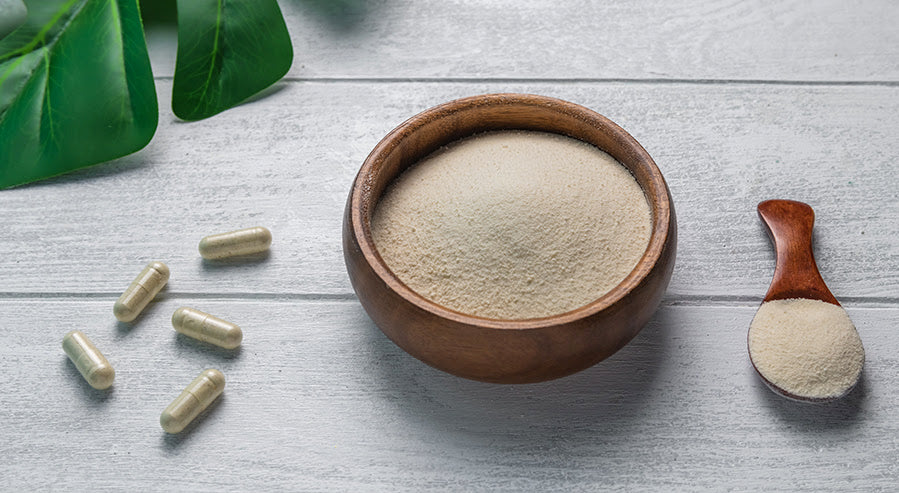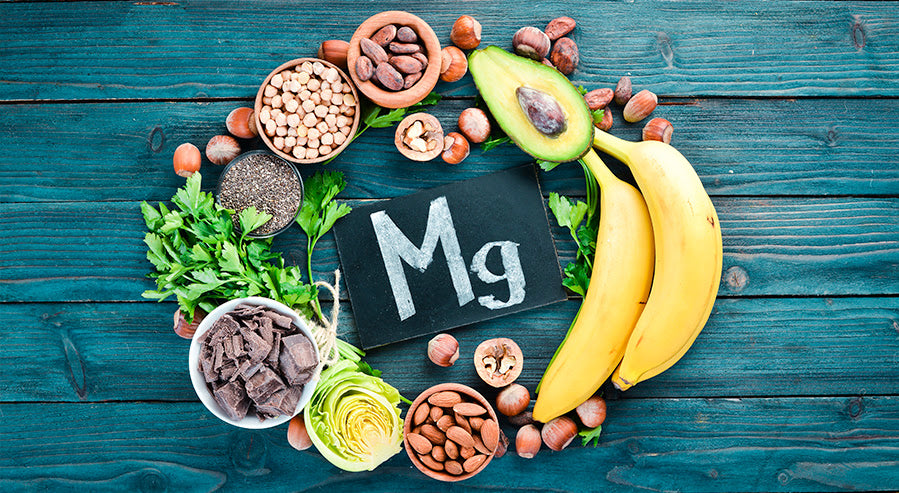The Ultimate Guide to Understanding Mineral Magnesium

Hey there! You're about to talk about a brief but rich guide in magnesium - now that's a mineral that sure does a lot for our health, right? This important nutrient gets your body ticking in so many ways. Without it, your bones wouldn't be so strong, and your blood pressure may not be in check. It even gets involved in the difficult business of DNA-making!
Ready for a closer look at magnesium? You're about to see just how really important this mineral is for our bodies - it does a lot to keep us in tip-top shape! As we process together, I'll make sure to illuminate every important detail about magnesium and its big job of maintaining our health.
The Part of Magnesium in the Body
Magnesium is pretty important for our bodies, wouldn't you say? It's involved in more than 300 enzyme systems, kind of like a part of a toolbox. All these different tools work together to keep things ticking along as they should. And when it comes to those funky biochemical reactions - creating proteins, which make our nerves work, controlling our blood sugar - they all need a little bit of magnesium to get the job done.
Has anyone ever told you that proteins are the building blocks of life? It's true! That's why magnesium is so important in our bodies. It helps put together these proteins from amino acids, like little LEGO bricks. The result? Your tissue can grow and repair, which is pretty important for our health and feeling good.

Magnesium has many uses beyond a one-trick pony, though. It's also really important for your nerve function. Imagine your nervous system like a giant network of telephone wires, passing along messages all the time. You need a bit of magnesium to keep those messages going smoothly.
Just when you thought magnesium had done enough, it's also important for controlling our blood sugar. Who would have thought? Just like the strings on a puppet, it has a grip on our blood sugar, stopping it from getting too high or too low. Keeping things nice and stable helps our bodies keep up their energy and stops things like diabetes from happening.
Oh, and let's not forget, magnesium has some friends. With a little help from nutrients like calcium and potassium, magnesium helps keep our heartbeats steady. Each beat of our hearts is a team effort, and magnesium is a really important factor. So, shouldn't we make sure we have lots of magnesium to keep our bodies at their best?
The Health Benefits of Magnesium
Did you know there's a boatload of reasons why you should care about the amount of magnesium in your body? Magnesium cements its spot as the fourth most abundant mineral in our bodies, and it sure has a load of important roles. Several health benefits come tagging along with suitable magnesium intake.
Ever felt moody? We've all been there, and guess what comes to the rescue? Mood regulation is an important job of our friend, good ol' magnesium. A nugget of knowledge from The Journal of the American Board of Family Medicine says that magnesium might lessen symptoms related to depression and anxiety - which could offer another way to deal with these problems.

Magnesium is also your friend when it comes to supporting quality sleep. A dash of insight from the Journal of Research in Medical Sciences suggests that low magnesium levels might drag down your sleep quality or introduce you to insomnia.
All you fitness buffs, this one's for you. According to the Journal of the International Society of Sports Nutrition, just the right amount of magnesium can really improve your exercise performance - what a bonus, eh? That's great news, whether you're an athlete, if it is a little up there in years, or if you're just under a ton of stress.
Next up - managing blood sugar levels. The World Journal of Diabetes says that enough magnesium intake could help you keep a tight grip on your blood sugar and might even push back against type 2 diabetes.
And don't even get me started on what it can do for your bones. That's right, this versatile mineral also dives into bone formation, directing the traffic of osteoblast and osteoclast activities. This keeps your bones fit, and guards against osteoporosis - and that's all backed up by research in the Nutrients journal.
Ladies, brace yourselves; magnesium coupled with Vitamin B6 might help soothe premenstrual symptoms; there's something inside me that gets that feeling when I look at the thrown-around-the-internet conclusions from BMJ.
But let's not get too carried away here! Even with all its health benefits, don't go thinking magnesium will patch up every health issue you have. I strongly urge you to always reach out to health experts for advice that fits you best. See, it all wraps back around the importance of a balanced diet, lifestyle, and overall health.
Where Can One Find Magnesium?
Magnesium is a really important mineral you'll find in many natural resources; your body can't make it - so you have to add it to your diet. You really can't ignore it! Think of foods full of fiber. They often pack a punch of magnesium. Great options? Legumes, whole grains, and certain veggies like broccoli, squash, and greens - and let's not forget seeds and nuts, almonds especially. Other sources can be dairy, meats, and surprise - chocolate and coffee. They're rich in magnesium, too!
Amazingly, seafood like mackerel, salmon, and halibut are great for magnesium. They're strong choices because they give you omega-3 fatty acids along with the mineral. So, when you're munching on foods filled with magnesium, you cover your needed intake; this cool hack lessens your need for supplements.
But don't get me wrong. I'm not saying magnesium supplements are useless; they offer a helping hand to meet the dietary requirement. But don't lean on them too much. Overuse could lead to issues like tummy troubles or diarrhea. Believe me, choosing a diet high in magnesium is a smarter lifestyle decision. Who wants to depend on supplements?

Changing your eating habits to include more foods that are loaded with magnesium can make your life balance better. When you do this, you'll also let your body soak up a mix of other really important nutrients. And remember how important it is to mix up your diet! Different food improves any diet,
A sweet treat worth mentioning is dark chocolate - a yummy, fun way to get magnesium in your diet. But don't get too carried away with the calories!
So, to boil it down, a different diet loaded with magnesium is the purest source of the mineral, and it'll help dodge any problems linked with supplement use. Supplements might seem enticing, but building a diet revved up with magnesium-rich food is definitely a winner in my book!
Find Signs of Magnesium Deficiency
Magnesium is a really important mineral. If you don't have enough of it, your body might give off some clues. Feeling tired a lot is often the first sign. That's because magnesium plays an important part in putting out energy. So, if you're low on magnesium, you'll likely feel pretty beat.
After feeling tired, muscle weakness or spasms might be the next thing you notice. These spasms have a want to name - myasthenia. Muscles need a good amount of magnesium to work properly. The nerves controlling our muscles also need this mineral to work well. Low magnesium - could it be messing with your muscles?

Then, there's osteoporosis - thin bones and a greater chance of breaking them. This could be linked to not enough magnesium. Why? Well, this mineral helps keep our bones healthy. Without enough of it, osteoporosis might get worse.
Asthma could flare up if you're low on magnesium. Scientists are still trying to figure out the details. But, it seems like magnesium helps loosen up the muscles around our lungs, which helps us breathe easier. So it makes sense - maybe not having enough magnesium could lead to more asthma attacks.
Next on the list is abnormal heartbeat or arrhythmia. Magnesium is important for a steady heartbeat. So if you don't have enough, your heart might start acting strange.
If someone is really low on magnesium, they might seem indifferent or emotionally numb. In severe cases, this can escalate to delirium or even a coma.
All in all, these symptoms might mean your body isn't balanced because it's lacking magnesium. But these symptoms can also point to other health problems. That's why it's so important to talk to a doctor when these signs start showing up. Magnesium deficiency isn't a joke - it can lead to serious health problems in the long run.
I can't stress this enough. Keep an eye on how you're feeling, and take action if something seems off. Your health depends on it!
Recommended Daily Intake and Supplementation
Magnesium sure does a lot for our bodies, right? Factors like age and gender mess around with how much you need each day for your recommended daily intake of magnesium. Take babies, for example - they need between 30 and 75 mg daily. As kids get older, their needs increase, and by the time they're between 9 and 13 years, they should be taking about 240 mg each day.
Teenage girls aged between 14-18? They need 360 mg daily. Boys the same age should shoot for 410mg. For adult men, the sweet spot is 400-420 mg a day. Women should aim for a bit lower, between 310 and 320 mg daily.
Pregnancy or breastfeeding? You'd need a bit more - usually between 350 and 400mg. The needs of older adults are basically the same as those of regular adults.

But beware, my friend! Pilling in over 350 mg of magnesium every day from supplements is risky business. You could end up with hypermagnesemia - a gnarly condition that sticks you with stomach cramps, nausea, or even diarrhea. In extreme cases, you're looking at heart issues. If this hits you, you have to get medical help ASAP.
But let's find out the light. Turns out, it's pretty easy to get the magnesium you need from food. We're talking legumes, nuts, seeds, green veggies, and whole grains. Who'd guess, right? So maybe you don't need to depend on those supplements after all. Try looking at what you eat - it might help you tip the balance between food and supplements, especially if getting enough magnesium from your diet is a tough gig.
Remember - while magnesium is important, too much of the things might just tip the balance the wrong way. In my opinion, finding that sweet spot in magnesium intake is the secret to a healthy lifestyle.
Finding The Perfect Blend
Magnesium is an important mineral that I can't stress enough; it gets involved in over 300 reactions in our bodies. These reactions include making proteins and keeping blood pressure steady. But the sad fact is a lot of people don't get enough magnesium in their diets.
The downside of not taking in enough magnesium can range from feeling tired and weak muscles to, eventually, heart issues and weakened bones. That just shows how important it is to keep magnesium levels where they need to be.
The best way to keep those magnesium levels up is by eating a good, balanced diet. It's in eating foods high in magnesium - I'm talking about things like whole grains, nuts, and greens. Sure, eating a balanced diet is a good solution, but a lot of people still fall short of getting enough magnesium each day. To make up for that shortfall, I recommend looking into magnesium supplements - just be sure to talk to a healthcare provider first.

I happen to work for a company, Teami, that has unique tea blends focused on better health and wellness. Our tea blends could supplement your diet, make up the gap in magnesium needs, help with weight loss, and even help with getting good sleep. And we don't stop at tea; we've also got skincare and body products that can help improve your health and give your skin a healthy glow. All in all, adding Teami to your daily schedule could be your ticket to a healthier lifestyle rich in magnesium.
Keeping a close eye on your magnesium needs is important for better health. Think about giving Teami a try if you want an easy way to increase magnesium in your diet - I believe we offer a great option. The bottom line is that it's totally doable to keep your magnesium levels in check with a smart diet - maybe some supplementation - and look at our variety of teas.
Subscribe to our Newsletter
Subscribe to our newsletter and get 10% off your first purchase
 Instagram
Instagram



